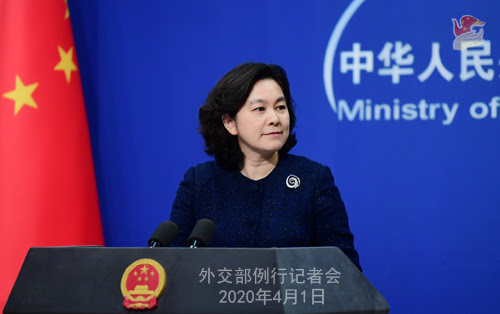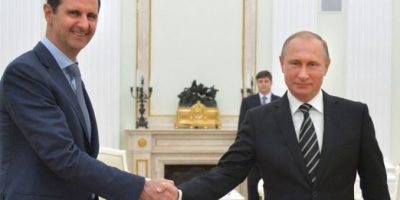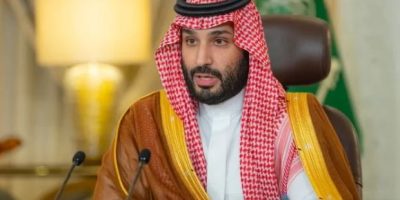Foreign Ministry Spokesperson Hua Chunying’s Regular Press Conference

Yesterday China and ASEAN held the second video conference on COVID-19 to share experience and further cooperation. As close neighbors, China and ASEAN countries have all along been helping each other since the COVID-19 broke out. On February 20, clinical experts from China and 10 ASEAN countries held the first video conference to exchange experience in epidemic prevention and control.
Yesterday saw another organized by the Chinese foreign ministry and the National Health Commission, coordinated by the ASEAN Secretariat, and attended by over 80 delegates including diplomats, health officials and medical experts from China and 10 ASEAN countries as well as the ASEAN Secretariat.
There were in-depth discussions on testing methods, case tracing, prevention and control measures, clinical treatment and asymptomatic cases. The three-hour long conference yielded good results. Both sides believe it helps regional countries make concerted efforts and enhance China-ASEAN cooperation in combating the virus.
CCTV: We know from yesterday’s announcement that the foreign ministry is considering the issue of overseas Chinese students returning to China. What specific measures will be taken next?
Hua Chunying: The CPC Central Committee attaches great importance to and cares deeply about Chinese students abroad. Following the outbreak of the COVID-19 in many places worldwide and in accordance with the directions of the CPC Central Committee, the foreign ministry instructed all the embassies and consulates overseas to take overall actions and do everything possible to pass on the care of the Party and the Government to Chinese students overseas. Not long ago, China arranged temporary flights to transfer people facing dire situations in Iran and Italy back to China in an orderly manner. Recently, due to the spread of the pandemic, international passenger flights have been scaled down sharply and some Chinese students studying abroad run into difficulties on their way back home. Upon learning such problems, the Chinese embassies and consulates in Ethiopia, Cambodia, and other countries took immediate actions and went all-out to help the students return home safe and sound, both by contacting their host countries and coordinating with the relevant departments back in China.
In view of the current situation in the UK and the difficulties faced by Chinese students there, the foreign ministry is actively coordinating with the Civil Aviation Administration and other departments to bring home students in need by extra flight tomorrow, April 2.
China National Radio: Recently the journal Science published a paper by researchers in the United States, the UK and China. One of the paper’s authors, an Oxford fellow, said that without the Wuhan travel ban and the national emergency response by the Chinese government, there would have been more than 700,000 confirmed COVID-19 cases outside of Wuhan by February 19. The report believes China’s control measures worked by successfully breaking the chain of transmission and preventing contact between infectious and susceptible people and bought other cities valuable time. What‘s your comment?
Hua Chunying: The paper’s findings are consistent with WHO’s view and the consensus of many countries’ leaders and experts. The Chinese government took the most comprehensive, thorough and rigorous prevention and control measures at the earliest time possible, which have been proven to be highly effective at the current stage. Our efforts bought precious time for the world to prepare for the pandemic. Just as WHO puts it, China has taken the most courageous, most flexible and most active prevention and control measures, which altered the dangerous course of the virus’ quick spread and prevented hundreds of thousands of infections nationwide. China stands ready to further international cooperation in fighting the pandemic and share experience with other countries to defeat the virus as soon as possible and safeguard regional and global public health security.
Beijing Youth Daily: The KN95 mask is a Chinese alternative to the N95 mask, but the US Food and Drug Administration (FDA) refuses to allow it into the country. Can you confirm that? What is your comment?
Hua Chunying: I have seen relevant reports but I am not aware of the specific situation. If this is the real case, frankly I don’t understand why the US side made this decision.
Under the current circumstances, all countries are in urgent need of masks. There is also a huge demand for them in China. Chinese companies are running at full steam around the clock to manufacture as many as possible to meet domestic demands and support other countries.
It is true that different countries and regions apply different standards when it comes to certifying these epidemic prevention and control products. But I don’t think this should become a sticking point in cooperation in such areas.
Global Times: The Grayzone, an independent news website in the US, recently published an article pointing out a recent surge in stories in the Western press on the so-called “forced labor“ report of the Uyghur Muslim ethnic minority in Xinjiang. The article says the report is actually sponsored by a right-wing Australian institution funded by the US government, NATO, and an eye-popping array of weapons manufacturers. It cites “testimonies” from a blog of religious fanatics. The website also disclosed that the endlessly repeated claims by Western media that China is detaining millions of Uyghur Muslims was built upon dubious interviews with a few crank experts. I wonder if you have a comment?
Hua Chunying: What you just cited already serves to illustrate a point. In some corners of the world, there are indeed a few people engaging in underhand dealings with sinister intentions. Anyone with a sense of right and wrong and common sense should be able to see the facts as they are and jointly reject such fake news.
AFP: The Cambodian King Norodom Sihamoni arrived in Beijing today for a medical checkup. Is it related to the COVID-19?
Hua Chunying: As you know, the Cambodian royal family has a very deep traditional friendship with China. They come here regularly. I am not aware of any connection between His Majesty’s visit to China and the COVID-19. It is just for a routine checkup.
The Paper: During his interviews with the Strait Times and Nikkei Asian Review on March 30, US Secretary of State Pompeo again accused China of spreading disinformation, saying China’s decision to force Western press out of the country would reduce the capacity for all to understand what’s happening there. I wonder if you could comment on his remarks?
Hua Chunying: We read the reports, too. I must say this is typical Pompeo in his “lying” and “cheating” style, but these comments are completely inconsistent with what President Trump said last week during his phone call with President Xi. Here I just want to make two things clear.
First, regarding “China’s decision to force Western press out of the country would reduce the capacity for all to understand what’s happening there”, Mr. Pompeo should honestly tell the world that the US State Department denied 29 Chinese journalists’ visas for no reason in the past two years and asked 60 Chinese journalists to leave the US within 10 days on March 2. What’s the true intention behind this? Could it be that they foresaw the epidemic in the US would develop into what the situation is today? Were they trying to conceal the domestic situation from the world?
The absence of some US journalists will not impede the international community from learning what’s going on in China, because our government has been open, transparent and responsible in publishing the epidemic data every day, which has been highly and unanimously acclaimed by all except Mr. Pompeo and several US politicians. Besides, there are still over 500 foreign journalists stationed in China. The world will have no difficulty whatsoever in learning about the true situation in China.
Second, while making all-out efforts to get the domestic situation better and more stable, the CPC, the Chinese government and people are supporting and helping other countries in need to minimize the pandemic’s impact on the economy and people’s health. We don’t need to lie and cheat to get anything. All we want is to safeguard the life and health of the 1.4 billion Chinese people and do our best to help other countries in their fight against the pandemic.
Shenzhen TV: US Secretary of State Pompeo said at a press conference on March 31 that the US contribution to global anti-pandemic response is far larger than that of China. Can you comment on his remarks?
Hua Chunying: I noticed relevant reports. Secretary Pompeo counted the US contribution to the international community since 1948. That’s very interesting. I’m curious, how much assistance the US actually provided to other countries in recent years? The US is the world’s largest economy and a developed country with unrivaled overall strength. China would surely be glad to see it providing more aid to developing countries. In fact, the more the better. It is the country’s due responsibility and obligation as the biggest developed country, and its due commitment to developing countries that should be fulfilled.
China, as the biggest developing country, has all along been providing aid to other developing countries with no political strings attached under the South-South cooperation framework. While fighting COVID-19 at home, we are helping other countries in need to the best of our ability. We do this to reciprocate these countries’ earlier support for us, and out of humanitarian considerations. We simply believe in doing our very best and have no intention to compete with anyone.
Reuters: Taiwan donated 10 million masks to the US and other countries. What‘s your comment? Second question, some Chinese supermarkets, gyms, bars, hotels and SPA houses refuse to serve foreigners citing the pandemic as the reason. Some say this is retaliation to Chinese nationals being demonized overseas. What‘s your comment?
Hua Chunying: On your first question about Taiwan’s donation of masks, if my memory serves me right, when the epidemic first broke out in China’s mainland, Taiwan authorities banned the export of masks. Now as we can see, the situation in the US is very severe, Chinese provinces, cities and businesses have been providing assistance to the American people. If the Taiwan region can and wants to help, I believe we are all glad to see it. But if anyone in Taiwan seeks to politicize the pandemic, I would advise them to think twice and act prudently.
On your second question, I haven’t heard of anything like that. As you know, when COVID-19 first hit China, a handful of Western politicians demonized and stigmatized China in their words, leading to injustice and discrimination against Chinese and Asians overseas. We the Chinese believe in not doing to others what you don’t want others to do to you. That’s why we stand firmly against and don’t allow discriminatory behavior targeting foreigners.
You mentioned some facilities like gyms and SPA parlors refuse to serve foreigners. I don’t think such facilities are open at this special time amid the pandemic. The Chinese people welcome foreign friends with kindness, warmth and generosity. But at this extraordinary time, there are regulations at government and community levels to ensure public health security. We hope foreign nationals living in China could understand, support and cooperate with relevant regulations. This is both for their own health and safety and public health security.
Press Trust of India: India and China plan to celebrate the 70th anniversary of the establishment of diplomatic relations in a big way from today, but the entire situation now is grim because of the coronavirus outbreak in both countries. So how does China plan to go ahead with this particular event which has been pre-planned for the entire year to mark this occasion? Second question, India is also trying to procure a lot of medical materials in view of the coronavirus outbreak in the country and they’re trying to procure various items, especially ventilators. Is China planning to do anything in this regard to help the situation?
Hua Chunying: First, congratulations. Today is indeed the 70th anniversary of the establishment of diplomatic relations between China and India. Leaders of the two sides have exchanged congratulatory messages.
During their meeting in Chennai, President Xi and Prime Minister Modi agreed to host 70 celebrating activities to mark the 70th anniversary of diplomatic ties, which will enhance China-India bilateral exchange and cooperation and showcase the deep historical connection between two ancient civilizations. The activities will deepen bilateral exchange in legislature, business, academics, culture, youth and defense. Chinese and Indian foreign ministries released detailed plans on October 22, 2019. As I know, the commemorative events have been unfolding. Due to the COVID-19, some exchange activities may be affected, but they will gain a stronger impetus after the pandemic. Taking the celebration of the 70th anniversary as an opportunity, we would like to work with India to elevate our bilateral relationship to a new height.
On your second question, we know that the people of India are also fighting against the COVID-19 under the leadership of Prime Minister Modi. We would like to share with India our experience and help them to the best of our ability.
With regard to ventilators, they are in great demand around the world. China is now under the pressure of preventing a resurgence at home and we also have a large demand for ventilators. As I’ve said many times, Chinese manufactures are working at full capacity day and night to produce ventilators and other supplies so that on top of meeting domestic demands, we can provide as many supplies as possible to other countries, including India. One more ventilator might mean more lives saved.
We know ventilators are sophisticated equipment of
We hope all countries will work together to ensure that the global supply chain is open, stable and secure. In short, we stand ready to continue to support and help India to the best of our ability.
Related News

Syrian leader to meet Putin, Russia seeks deal on military bases
MOSCOW, JAN 28: Syrian President Ahmed al-Sharaa will meet Russian counterpart Vladimir Putin in MoscowRead More

Riyadh will not permit attacks on Iran from Saudi territory: crown prince
RIYADH, JAN 28: Saudi Crown Prince Mohammed bin Salman told Iranian President Masoud Pezeshkian duringRead More


Comments are Closed